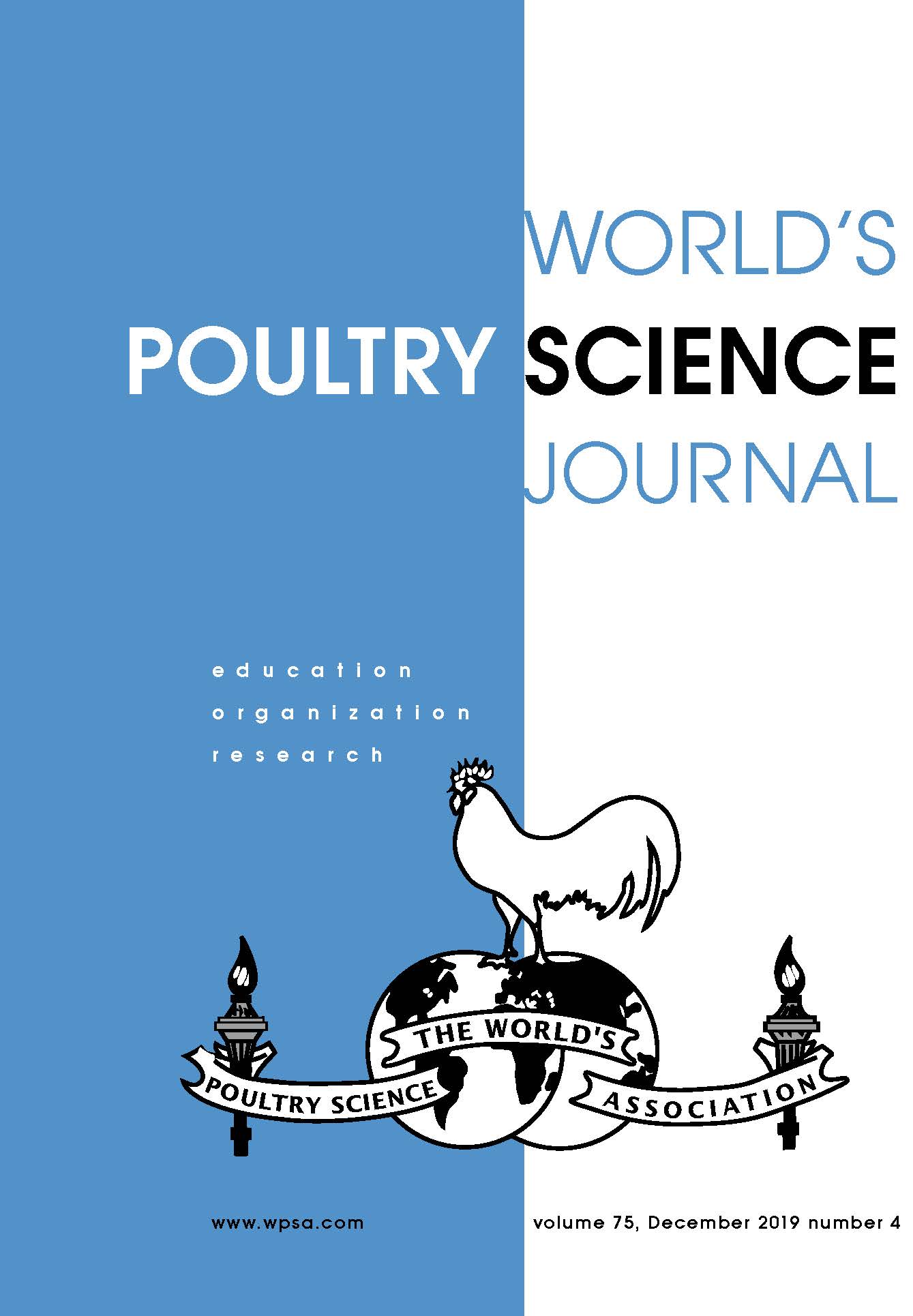Crossref Citations
This article has been cited by the following publications. This list is generated based on data provided by
Crossref.
Kidd, M.T.
Morgan, G.W.
Zumwalt, C.D.
Price, C.J.
Welch, P.A.
Brinkhaus, F.L.
and
Fontana, E.A.
2001.
α-Galactosidase Enzyme Supplementation to Corn and Soybean Meal Broiler Diets.
Journal of Applied Poultry Research,
Vol. 10,
Issue. 2,
p.
186.
Farhangi, M
and
Carter, C G
2001.
Growth, physiological and immunological responses of rainbow trout (Oncorhynchus mykiss) to different dietary inclusion levels of dehulled lupin (Lupinus angustifolius).
Aquaculture Research,
Vol. 32,
Issue. ,
p.
329.
Van Immerseel, F.
Cauwerts, K.
Devriese, L.A.
Haesebrouck, F.
and
Ducatelle, R.
2002.
Feed additives to control Salmonella in poultry.
World's Poultry Science Journal,
Vol. 58,
Issue. 4,
p.
501.
Juskiewicz, J.
Jankowski, J.
Zdunczyk, Z.
Biedrzycka, El.
and
Koncicki, A.
2005.
Performance and microbial status of turkeys fed diets containing different levels of inulin*.
European Poultry Science,
Vol. 69,
Issue. 4,
p.
175.
Verdonk, J. M. A. J.
Shim, S. B.
van Leeuwen, P.
and
Verstegen, M. W. A.
2005.
Application of inulin-type fructans in animal feed and pet food.
British Journal of Nutrition,
Vol. 93,
Issue. S1,
p.
S125.
Lan, Yu
Williams, Barbara A.
Tamminga, Seerp
Boer, Huug
Akkermans, Antoon
Erdi, Ga
and
Verstegen, Martin W.A.
2005.
In vitro fermentation kinetics of some non-digestible carbohydrates by the caecal microbial community of broilers.
Animal Feed Science and Technology,
Vol. 123-124,
Issue. ,
p.
687.
Pelicano, ERL
Souza, PA
Souza, HBA
Figueiredo, DF
Boiago, MM
Carvalho, SR
and
Bordon, VF
2005.
Intestinal mucosa development in broiler chickens fed natural growth promoters.
Revista Brasileira de Ciência Avícola,
Vol. 7,
Issue. 4,
p.
221.
Juśkiewicz, Jerzy
Klewicki, Robert
and
Zduńczyk, Zenon
2006.
Consumption of galactosyl derivatives of polyols beneficially affects cecal fermentation and serum parameters in rats.
Nutrition Research,
Vol. 26,
Issue. 10,
p.
531.
Mcdevitt, R.M.
Brooker, J.D.
Acamovic, T.
and
Sparks, N.H.C.
2006.
Necrotic enteritis; a continuing challenge for the poultry industry.
World's Poultry Science Journal,
Vol. 62,
Issue. 2,
p.
221.
Ghosh, H.K.
Halder, G.
Samanta, G.
Paul, S.K.
and
Pyne, S.K.
2006.
Effect of Dietary Supplementation of Organic Acid and Mannan Oligosaccharide on the Performance and Gut Health of Japanese Quail (Coturnix coturnix japonica).
Asian Journal of Poultry Science,
Vol. 1,
Issue. 1,
p.
1.
Juśkiewicz, J.
Jankowski, J.
Zduńczyk, Z.
and
Mikulski, D
2006.
Performance and Gastrointestinal Tract Metabolism of Turkeys Fed Diets with Different Contents of Fructooligosaccharides.
Poultry Science,
Vol. 85,
Issue. 5,
p.
886.
Pelicano, ERL
Souza, PA
Souza, HBA
Figueiredo, DF
and
Amaral, CMC
2007.
Morphometry and ultra-structure of the intestinal mucosa of broilers fed different additives.
Revista Brasileira de Ciência Avícola,
Vol. 9,
Issue. 3,
p.
173.
Ribeiro, AML
Vogt, LK
Canal, CW
Cardoso, MRI
Labres, RV
Streck, AF
and
Bessa, MC
2007.
Effects of prebiotics and probiotics on the colonization and immune response of broiler chickens challenged with Salmonella Enteritidis.
Revista Brasileira de Ciência Avícola,
Vol. 9,
Issue. 3,
p.
193.
Paul, Samik K.
Halder, Gobinda
Mondal, Manas K.
and
Samanta, Gautam
2007.
Effect of Organic Acid Salt on the Performance and Gut Health of Broiler Chicken.
The Journal of Poultry Science,
Vol. 44,
Issue. 4,
p.
389.
Vesna, Tokic
Miodrag, Lazarevic
Z., Sinovec
and
A., Tokic
2007.
The influence of different feed additives to performances and immune response in broiler chicken.
Acta veterinaria,
Vol. 57,
Issue. 2-3,
p.
217.
Williams, J.
Mallet, S.
Leconte, M.
Lessire, M.
and
Gabriel, I.
2008.
The effects of fructo-oligosaccharides or whole wheat on the performance and digestive tract of broiler chickens.
British Poultry Science,
Vol. 49,
Issue. 3,
p.
329.
Owens, B.
Tucker, L.
Collins, M.A.
and
McCracken, K.J.
2008.
Effects of different feed additives alone or in combination on broiler performance, gut microflora and ileal histology.
British Poultry Science,
Vol. 49,
Issue. 2,
p.
202.
Silva, Vanessa Karla
Silva, Janaina Della Torre da
Gravena, Rodrigo Antonio
Marques, Rafael Henrique
Hada, Fabricio Hirota
and
Moraes, Vera Maria Barbosa de
2009.
Desempenho de frangos de corte de 1 a 21 dias de idade alimentados com rações contendo extrato de leveduras e prebiótico e criados em diferentes temperaturas.
Revista Brasileira de Zootecnia,
Vol. 38,
Issue. 4,
p.
690.
Jia, W.
Slominski, B.A.
Bruce, H.L.
Blank, G.
Crow, G.
and
Jones, O.
2009.
Effects of diet type and enzyme addition on growth performance and gut health of broiler chickens during subclinical Clostridium perfringens challenge.
Poultry Science,
Vol. 88,
Issue. 1,
p.
132.
Vidanarachchi, J. K.
Elangovan, A. V.
Mikkelsen, L. L.
Choct, M.
and
Iji, P. A.
2010.
Effect of some plant extracts on growth performance, intestinal morphology, microflora composition and activity in broiler chickens.
Animal Production Science,
Vol. 50,
Issue. 9,
p.
880.


